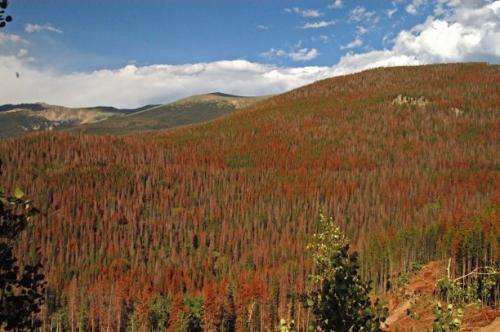Higher ed must lead climate change adaptations

Higher Education institutions play a key role and must be leaders in preparing society to adapt to the needs of a changing climate, according to a new report evaluating education, research, campus sustainability and public outreach.
It boils down to leading by example in working to mitigate the challenges posed to society by a changing climate and creating opportunities in new and more sustainable technologies, said the University of Arizona's Jonathan Overpeck, a member of the national committee that produced the report and one of world's leading experts on climate change and policy.
"So often our society is reactive; we're trying to make it as proactive as we can and position our state and country in the lead in what will become a much bigger driver the world's economy, meeting the climate change challenge," said Overpeck, co-director of the Institute of the Environment and a professor of geosciences and atmospheric sciences.
Published by the American College and University Presidents' Climate Commitment, the report calls on higher education institutions to create campuses that are safe and secure in the face of change, more actively engaged in solving real-world problems and reorganized to better provide the education and research needed to create and maintain a sustainable society.
The UA is cited in the report for its "varied and extensive research in adaptation to climate change," with specifics projects including "developing adaptation-planning frameworks, understanding consumer choices and their collective impact on the adaptive capacities of communities, and conducting experiments on the resilience of forest and rangeland ecosystems to climate changes to help inform adaptive management of natural resources."
Beyond this expansive and interdisciplinary world-class research are efforts at green initiatives and sustainable building on campus, a wide range of course offerings to educate the next generation of citizens and leaders on scientific and policy issues related to climate change and solutions, and active, ongoing partnerships with society at large, including lawmakers, community leaders and business sectors.
"We're certainly laying down a challenge to everybody, particularly our peers in universities, to do this," Overpeck said. "It's amazing that there are some strong universities around the country still not paying much attention to climate and creating sustainable campuses. A large member of many communities across the county, universities can not only set an example, but they can help others achieve higher levels of sustainable practice."
Overpeck hasn't slowed down his research and advocacy, even on sabbatical. A recent visit to a Chinese university highlights the urgency in forging a new path ahead.
"The genie is out of the bottle in China. The universities are now encouraged to talk about environmental issues, to talk about climate change and to push themselves and their communities to do what needs to be done.
"That's good news because it means China will rapidly become a partner in solving the global climate challenge we have, but it's also a challenge in economic terms because China knows so well that it can be the world leader in economic gains from providing solutions.
"I see it positioning itself to become a major competitor to provide knowledge and technological solutions for the future, and I worry that in America, with the political polarization that exists around the issue, we will falter. This is a matter of economic strength and national security in becoming leaders in solving the climate change challenges."
More information: www.presidentsclimatecommitmen … er-ed-adaptation.pdf
Provided by University of Arizona



















